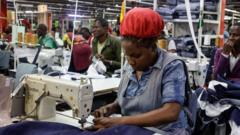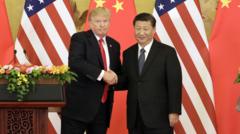As Lesotho's textile industry faces a critical blow from President Trump's new tariffs, the future of the African Growth and Opportunity Act (Agoa) is now at risk, potentially undermining economic relations between the US and several African nations.
Trump's Tariffs Threaten US-Africa Trade Relations

Trump's Tariffs Threaten US-Africa Trade Relations
New import tariffs pose uncertainty for African economies reliant on trade with the US.
In recent news, Lesotho's garment workers are bracing for dire consequences as they react to President Donald Trump's announcement of a staggering 50% import tariff on their products entering the United States. This new policy has led to a sense of despair among the textile sector's stakeholders, as local businesses fear their exports will become unviable due to inflated prices. Teboho Kobeli, who runs Afri-Expo Textiles, expressed grave concerns over the significant impact this could have on his 2,000 employees and the country's economy.
For years, Lesotho has thrived under the African Growth and Opportunity Act (Agoa), a US law aimed at promoting trade with African countries by providing them guaranteed duty-free access for specific exports. While the act has had a mixed record, many credit it with generating numerous jobs in Lesotho, particularly within the textile industry. However, the recent tariff imposition casts a shadow over Agoa's future.
Complicating matters is the divergence of perspectives among Southern African nations regarding the tariffs. South Africa, which exports metals and vehicles, posits that these new tariffs will effectively nullify the benefits gained from Agoa. In contrast, Kenya remains cautiously optimistic, asserting that due to the relative ease of their impacts—10% tariffs—the country might still maintain competitive export capabilities to the US.
Despite the uncertain outlook for Agoa, which is set for renewal later this year, the economic ramifications of Trump's tariffs are expected to be significant. As an analysis from the World Bank predicted, Lesotho could experience economic contraction, with losses reaching 1% of GDP within two years if Agoa benefits are revoked.
Notably, Trump's tariffs emphasize a worrying trend that could diminish America's influence in Africa, with the potential for China to seize increased trading opportunities. The swift policy alterations of the Trump administration have also led to reductions in US aid programs, further weakening America's standing in the region.
As the US grapples with shifting trade policies, former trade officials and analysts note that the chaotic nature of current political dynamics has placed historic agreements like Agoa in jeopardy. With no clear strategy from the Trump administration on tariffs and international trade, America's soft power in Africa faces considerable challenges.
In a scenario where Agoa becomes obsolete, Africa may need to reconsider its economic strategies, including fostering intra-continental trade and seeking new partnerships to ensure sustainable growth.





















